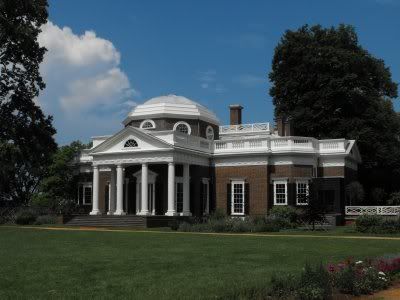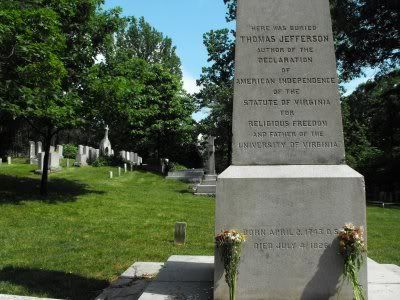 Ever since USA Today ran an article about Thomas Jefferson's homes, I've been chomping at the bit to see one myself. Coincidentally, the route I'm taking led through Charlottesville -- where Jefferson's more famous Monticello is located.
Ever since USA Today ran an article about Thomas Jefferson's homes, I've been chomping at the bit to see one myself. Coincidentally, the route I'm taking led through Charlottesville -- where Jefferson's more famous Monticello is located.So I dished out the $20 and spent a few hours there. It was worth it, even if I couldn't take pictures of the inside.
Jefferson was a cool guy; on a personal level I think we'd get along well. The polylingual Francophile was fascinated by understanding how things work (he was his own architect), and rationality drove his thinking. He loved books and hated superstition. He usually dressed plainly (once causing a diplomatic incident with the British ambassador), and put his faith in education. His dream was for the American people to educate themselves and live their lives free from government meddling.

He had his share of weaknesses, though from what I learned at Monticello I don't think he was a hypocrite (the slaveowner who posited "all men are created equal" is quite a contradiction). Rather, he felt he was a realist. Slavery was something he didn't know how to deal with, but he felt he did what he could -- he released the slaves that had acquired the trade skills to succeed on their own, and the ended the importation of new slaves from Africa. He hoped that the next generation would have a better answer.

Jefferson could also be arrogant. It was only after being elected that he believed in a strong executive, provoking the accusation that his doctrines were, above all, self-serving. Plus he edited his own version of the Bible, leaving the good teachings but taking out what he perceived to be unscientific. (And considering he died in debt as a result of loans he cosigned, he probably should have paid better attention to Proverbs 6:1-5.) He comes off as a person who felt he could do things because he was smarter, but that other people shouldn't do the same.
I can see a lot of myself in both sides of his character.

His tombstone lists his three greatest accomplishments as writing the Declaration of Independence, writing Virginia's Statute for Religious Freedoms, and founding the University of Virginia -- the legacy is the political, religious, and academic freedom we enjoy today.

No comments:
Post a Comment